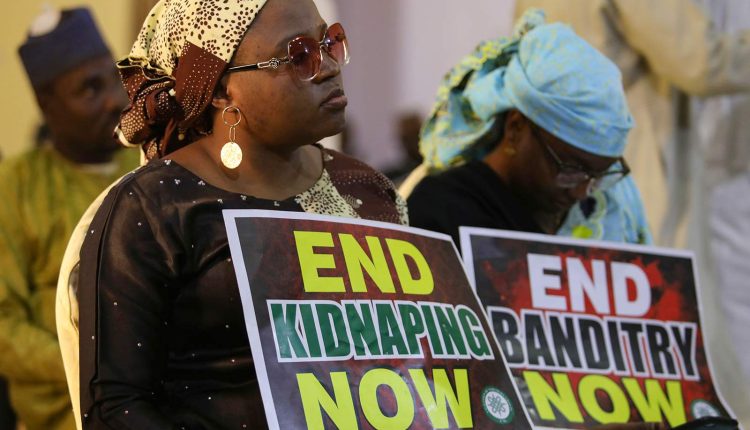Nigeria may review its security strategies in a bid to tackle the menace of kidnapping for ransom. Kidnapping has become a major challenge in the country. Lately, criminal gangs have become more daring, targeting highways, schools and residential areas.
After years of efforts at curbing the menace, government may now prioritize the non kinetics approaches to achieve lasting peace and end kidnapping in the country.
This was the one of the recommendations of the security agencies to the government as a way of finding a permanent solution to armed banditry and kidnapping.
Loss of lives of some kidnapped victims, ransom payments, forceful closure of schools and businesses as well as restrictions in farming activities are some of the socio-economic consequences of kidnapping in Nigeria.
Available data shows that incidents and cases of kidnapping began to rise in 2014 with 84 kidnapping incidents involving 897 victims and peaked in 2021 with 590 incidents involving 5,287 victims.
In 2014 and 2015 the Northeast and Niger Delta area of Nigeria had the highest number of victims as a result of the activities of Boko Haram insurgency and militancy.
There were also mass abduction incidents involving more than 20 victims. While there were five such abductions in 2015, Nigeria recorded 11 cases in 2018, eight in 2019, 25 in 2020, 69 in 2021 and 40 in 2022.
Large-scale abductions have also targeted schoolchildren. Thousands of students have been kidnapped in Borno State’s Chibok, Niger State’s Kagara, Zamfara State’s Jangebe, Kaduna State’s Afaka, and Kebbi State’s Yauri.
Before then, abduction was mainly restricted to the Niger Delta region, where militants mostly went after oil workers for ransom. There were also cross boarder kidnappings that led to the celebrated arrests of kidnap kingpins like Evans and killing of few others around the flash points areas by the security operatives.
However, a few years later, particularly in 2020, 2021, and 2022 the North Central and Northwest became the hardest-hit regions due to the spread of terrorism and banditry.
Among the recent kidnappings are the five sisters who were taken hostage in the Abuja suburb of Bwari a few weeks ago along with their father, Mansoor Al-Kadriyar, who was later released to raise ransom of six hundred million naira.
One of the sisters, Twenty-one-year-old Nabeeha, a final-year university student, was killed a few days after her father’s release as a warning that the ransom must be paid.
It is gratifying to note that one of the criminals behind the dastardly act has been arrested by the Nigerian Police
In spite of this, a law that criminalizes ransom payments aimed at tackling spiraling and lucrative kidnapping industry in Nigeria, was passed in 2022 by the Nigerian parliament. The Rivers State House of Assembly also passed a prohibition of kidnapping law in the state, making kidnapping an offence punishable by life imprisonment.
It carries a sentence of at least 15 years for anyone who pays a ransom, but no-one has been arrested for ransom payment despite confirmation of such payments by some victims.
Politicians and the media have questioned the government’s strategy after gangs targeted parts of the well guarded Federal Capital Territory.
Some experts believed the country’s economic crisis and rising unemployment rates are driving the rise in kidnappings as desperate Nigerians turn to crime for survival.
Amnesty International recently asked President Bola Tinubu to treat the recent kidnapping incidents across the country as an emergency by adopting measures that will minimize the security challenge and restore hope of a secured society.
Nonetheless, there is a clear indication of the government’s interest and commitment towards guaranteeing the security of lives and property to ensure a safer society.
The government of President Bola Ahmed Tinubu has introduced policies that have been carefully designed to meaningfully engage the youth and discourage them from crimes.
One of them is the government’s plan to generate one million new jobs in the digital economy; a vocation Nigerian youth have proven to be good at.
Government has also initiated a students’ loan scheme, which is an interest-free loan to Nigerian students in tertiary institutions to fund their higher education with ease.
The Tinubu administration has also pledged to remove all bottlenecks to investments, especially for startups by repositioning the economy to favour the youths.
President Tinubu said government will embark on massive education of youth as a way of tackling the increasing kidnapping for ransom cases.
Nigerian youth needs to be empowered as stakeholders in building a Nigeria that thrives. This must be backed up with human welfare development policies.
Other measures include empowerment programmes, effective Sim cards registrations to ensure tracking of kidnappers and collaboration in intelligence gathering and sharing among security agencies, and enforcement of laws to stop ransom payment.
The Nigerian security agencies after series of review of the fight against kidnappings and banditry recently recommended non kinetics approaches to be prioritized to achieve lasting peace and end kidnapping in Nigeria.
By adopting such measures and blocking sources of small arms and sophisticated weapons into Nigeria from her borders, it is hoped that the menace will be brought to an end for a better and more productive society.

